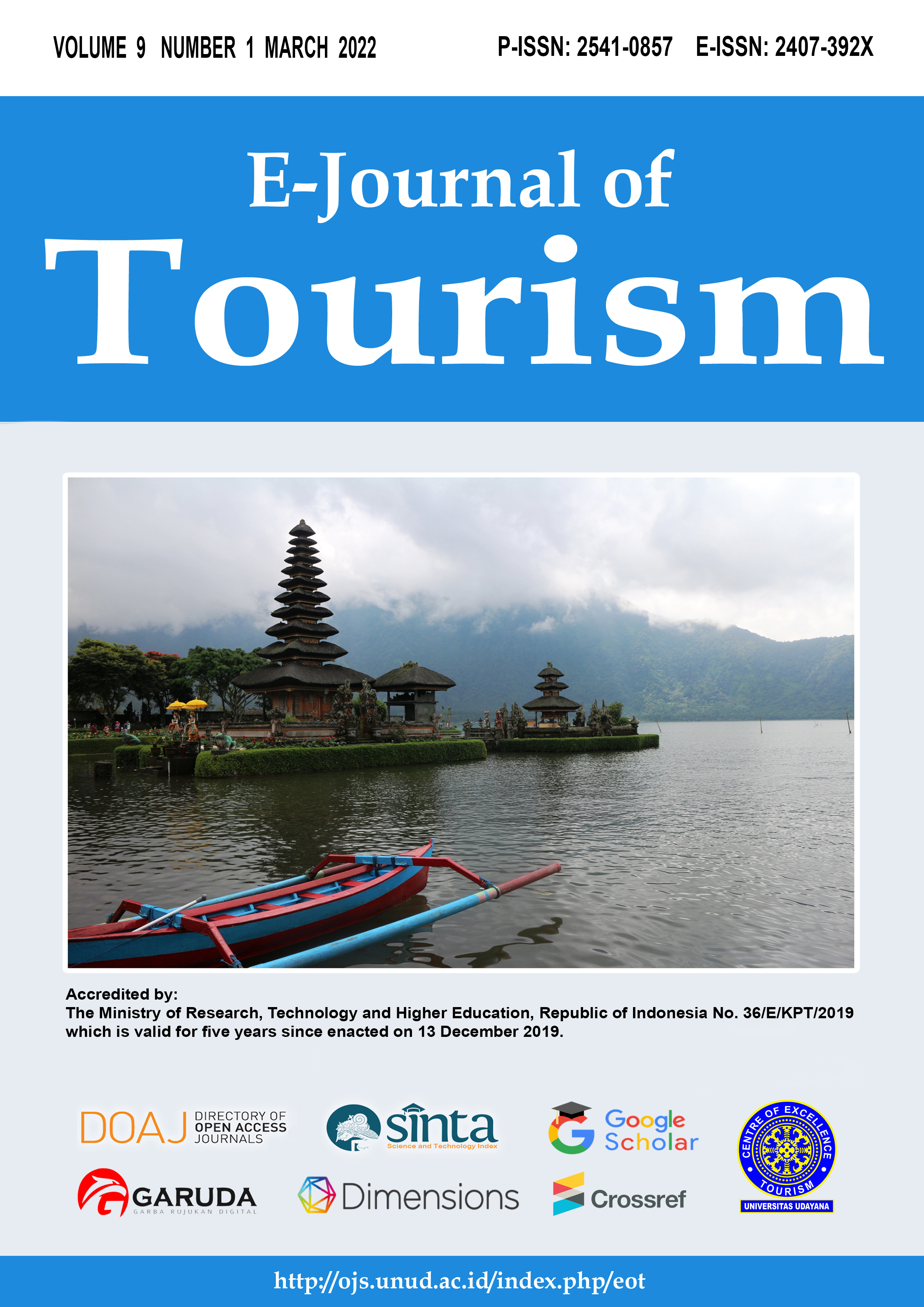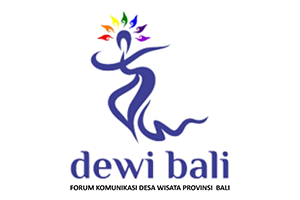Lesson Learned: Shaping Collaboration Among Tourism Stakeholders During Mount Agung Eruption
Abstract
The purpose of this study is to investigate the situation during the eruption of Mount Agung and the roles played by tourism stakeholders during the crisis. The findings of the study provide a more in-depth understanding of the lessons acquired by tourism stakeholders in Bali when dealing with catastrophic events, particularly natural disasters. For the purpose of this study, this research included interviews with 19 informants from a variety of tourist stakeholders, as well as those in charge of coping with natural catastrophes. According to the findings of the research, there are several lessons that can be learned from the eruption of Mount Agung, which will help tourism stakeholders be better prepared in dealing with all of the crises that may arise in the future.
Keywords: natural disaster, tourism, volcanic, mount agung, stakeholder, crisis management
Downloads
References
BPS, 2019. Jumlah Wisatawan Asing yang Datang ke Bali Menurut Pintu Masuk, 2009-2018. Available from https://bali.bps.go.id/statictable/2018/03/05/46/jumlah-wisatawan-asing-ke-bali-menurut-pintu-masuk-2009-2018.html. [Accessed 8 February 2019].
Berg, B.L., 2006. Qualitative research methods for the social sciences. London: Pearson Allyn and Bacon
Bhaskara, G.I. 2017. Gunung berapi dan Pariwisata: bermain dengan api. Jurnal Analisis Pariwisata, 17(1), 31-40.
BNPB. 2006, Rencana Aksi Nasional Pengurangan Risiko Bencana 2006-2009, Perum Percetakan Negara RI, Jakarta.
BNPB, 2019. Bencana alam di Indonesia 1815 S/D 2019. Available from http://dibi.bnpb.go.id/ [Accessed 3 Janury 2019].
Bryman, A., 2008. Social research method. 3rd edition. Oxford: Oxford University Press.
Burns, R.B., 2000. Introduction to research. London: Sage
Buultjens, J., Ratnayake, I. and Gnanapala, A. C., 2017. Sri Lankan Tourism development and implications for resilience. In: Butler, R. W., ed. Tourism and Resilience. Oxfordshire: CABI, 83-95.
Cochrane, J., 2010. The sphere of tourism resilience. Tourism Recreation Research [online], 35 (2), 173-185.
Corbetta, P., 2003. Social research: theory, methods and techniques. London: SAGE Publications.
Djalante, R. and Thomalla, F., 2012. Disaster risk reduction and climate change adaptation in Indonesia: Institutional challenges and opportunities for integration. International Journal of Disaster Resilience in the Built Environment [online], 3(2), pp.166-180.
Drabek, T. E., 2000. Disaster evacuations: tourist-business managers rarely act as customers expect. The Cornell Hotel and Restaurant Administration Quarterly [online], 41 (4), 48-57.
Edoardo, Z., 2018. Lombok projected to lose 100,000 tourists after earthquake. Available from https://www.thejakartapost.com/news/2018/08/24/lombok-projected-to-lose-100000-tourists-after-earthquake.html [Accessed 4 February 2019].
Fairbairn, T. I. J. 1997. The economic impact of natural disasters in the south Pacific with special reference to Fiji, Western Samoa, Niue and Papua New Guinea. South Pacific Disaster Reduction Programme.
Faulkner, B., 2001. Towards a framework for tourism disaster management. Tourism Management [online], 22, 135-147.
Faulkner, B. and Vikulov, S., 2001. Katherine, washed out one day, back on track the next: a post-mortem of a tourism disaster. Tourism Management [online], 22, 331-344.
Gayle, D. Bannock, C., 2018. Lombok earthquake: Britons tell of panic as they evacuate Gili islands. Available from https://www.theguardian.com/world/2018/aug/06/britons-stranded-after-lombok-earthquake-tell-of-panic-and-looting. [Accessed 8 February].
Hall, C. M., Prayag, G. and Amore, A., 2018. Tourism and resilience: individual, organisational and destination perspectives. Bristol: Channel View Publications.
Handmer, J. and Dovers, S., 2007. Handbook of disaster and emergency policies and institutions. London: Earthscan.
Huang, J. and Min, J. C. H. 2002. Earthquake devastation and recovery in tourism: the Taiwan case. Tourism Management [online], 23,145–154.
Hystad, P. W. and Keller, P. C., 2008. Towards a destination tourism disaster management framework: long-term lessons from a forest fires disaster. Tourism Management [online], 29, 151-162.
Kokelaar, P. 2002. Setting, chronology and consequences of the eruption of Soufri??re Hills Volcano, Montserrat (1995-1999). Geological Society London Memoirs [online] 21(1):1-43.
Murphy, P. E and Bayley, R., 1989. Tourism and disaster planning. Geographical Review [online], 79 (1), 36-46.
Nguyen, D. N., Imamura, F. and Luchi, K., 2017. Public-private collaboration for disaster risk management: a case study of hotels in Matsushima, Japan. Tourism Management [online], 61, 129-140.
Norris, F. H., Stevens, S. P., Pfefferbaum, B., Wyche, K. F. and Pfefferbaum, R. L., 2008. Community resilience as a metaphor, theory, set of capacities, and strategy for disaster readiness. American Journal of Community Psychology [online], 41, 127-150.
Novelli, M., Burgess, L. G., Jones, A., and Ritchie, B. W., 2018. ‘No Ebola...Still doomed’ - the Ebola-induced tourism crisis. Annals of Tourism Research [online], 70, 76-87.
Schneider, K., 2018. Tourists desperately try to flee Indonesia following earthquake Available from https://www.news.com.au/travel/travel-updates/warnings/tourists-desperately-try-to-flee-indonesia-following-earthquake/news-story/b87c64d3c8d66abfc327962562676f32 [Accessed 6 February 2019].
Skoufias, E., Strobl, E. and Tveit, T., 2017. Natural disaster damage indices based on remotely sensed data: an application to Indonesia. The World Bank.
Peterson, R. R., Harrill, R. and Dipietro, R. B., 2017. Sustainability and resilience in Caribbean tourism economies: a critical inquiry. Tourism Analysis [online], 22, 407-419.
Prideaux, B., 2004. The need to use disaster planning frameworks to respond to major tourism disasters. Journal of Travel and Tourism Marketing [online], 15 (4), 281-298.
Pyke, J., De Lacy, T., Law, A. and Jiang, M., 2016. Building small destination resilience to the impact of bushfire: a case study. Journal of Hospitality and Tourism Management [online], 28, 49-58.
Ritchie, B. W., 2004. Chaos, crises and disasters: a strategic approach to crisis management in the tourism industry. Tourism Management [online], 25, 669-683.
Ruiz-Ballesteros, E., 2011. Social-ecological resilience and community-based tourism: an approach from Agua Blanca, Ecuador. Tourism Management [online], 32, 655-666
Tyrrell, T. J. and Johnston, R. J., 2008. Tourism sustainability, resiliency and dynamics: towards a more comprehensive perspective. Tourism and Hospitality Research [online], 8 (1), 14-24.
UNDP Indonesia 2008a, Lessons Learned – Disaster Management Legal Reform: The Indonesian Experience, UNDP Indonesia, Jakarta.
UNDP Indonesia 2008b, Lessons Learned Indonesia’s Partnership for Disaster Risk Reduction,
The National Platform for DRR and the University Forum, Jakarta.

This work is licensed under a Creative Commons Attribution 4.0 International License.
The copyright of the received article shall be assigned to the journal as the publisher of the journal. The intended copyright includes the right to publish the article in various forms (including reprints). The journal maintains the publishing rights to the published articles.




















